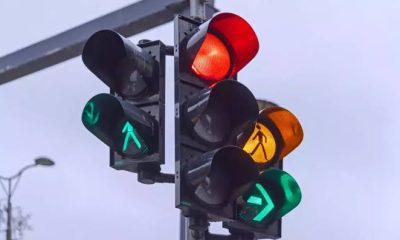Driver Training
Deadly Distraction: Dangers of Phone Use While Driving

It’s a common sight on Nigerian roads: a driver balancing one hand on the wheel while the other clutches a phone, eyes darting between the road and a glowing WhatsApp chat. In Lagos, Abuja, Port Harcourt, and beyond, this behavior has become normalized, even among commercial bus and truck drivers.
Also Read: Why Distracted Driving is Overtaking Speeding as the Leading Road Killer
But the cost is devastating. According to the Federal Road Safety Corps (FRSC), distracted driving with phone use as the leading cause contributed to over 5,000 crashes in 2023 alone.
The World Health Organization (WHO) classifies mobile phone use while driving as a major global road safety risk, increasing the likelihood of accidents by up to four times.
This article explores the deadly dangers of phone use while driving in Nigeria, why the habit persists, and what must be done to curb this rising menace.
1. Why Drivers Keep Using Phones Behind the Wheel
Despite awareness campaigns, many Nigerian motorists continue to use phones while driving. Reasons include:
- Overconfidence: Many believe they can multitask, unaware of how quickly distraction can lead to disaster.
- Cultural Normalization: It’s common to see drivers on calls at checkpoints, in traffic jams, or even at highway speeds reinforcing the idea that it’s “not that serious.”
- Weak Enforcement: Although the law prohibits phone use while driving, enforcement is inconsistent. Drivers often bribe their way out of fines.
- Work Pressure: For commercial drivers, missing a call might mean losing customers or business opportunities.
- Tech Addiction: With WhatsApp, Facebook, Instagram, and TikTok driving social interaction, the urge to respond instantly is irresistible for many.
2. How Phone Use Distracts Drivers
Phone use creates three kinds of distraction:
- Visual Distraction: Eyes leave the road to check the phone.
- Manual Distraction: Hands leave the wheel to dial, type, or scroll.
- Cognitive Distraction: The driver’s mind focuses on the conversation, not the road.
Even a 2-second glance away can be fatal at 100 km/h your car travels the length of a football pitch blind.
Fact Check: The FRSC warns that texting while driving is as dangerous as driving blindfolded for 5 seconds.
3. The Deadly Consequences on Nigerian Roads
The effects of phone-related distraction are severe:
- Rear-End Collisions: Common in Lagos traffic, where drivers on phones fail to notice when vehicles ahead stop suddenly.
- Head-On Crashes: On highways like Abuja–Lokoja, distracted drivers often drift into oncoming lanes.
- Pedestrian Fatalities: Drivers using phones frequently ignore crossings, endangering schoolchildren and commuters.
- Commercial Vehicle Risks: When bus drivers and truck operators use phones, dozens of passengers or other road users are put at risk.
Case Example:
In June 2024, a tragic crash on the Enugu–Onitsha expressway claimed four lives after a driver lost control while texting. Witnesses reported the driver had both hands off the wheel moments before veering off the road.
4. Why Hands-Free Devices Are Not a Complete Solution
Many Nigerian drivers argue: “I’m safe because I use hands-free.” But studies show otherwise.
- Hands-free reduces manual distraction, but cognitive distraction remains.
- Conversations still divert mental focus away from traffic conditions.
- The WHO warns that drivers using hands-free are as impaired as drunk drivers in terms of reaction time.
Bottom line: Whether handheld or hands-free, phone use behind the wheel is unsafe.
5. Nigeria’s Laws Against Phone Use While Driving
Under the National Road Traffic Regulations (2012), using a mobile phone while driving is prohibited, punishable by fines of ₦4,000 – ₦5,000, license points, and possible prosecution.
But the laws suffer from:
- Poor Enforcement: Officers cannot monitor every road.
- Bribery: Offenders often settle with ₦1,000 at the roadside.
- Weak Penalties: A ₦5,000 fine is too small to deter offenders, especially wealthier motorists.
In contrast, countries like the UK fine drivers up to £200 and add six penalty points enough to suspend licenses.
6. Human Stories: The Pain Behind the Numbers
Ngozi, a mother in Lagos:
“My son was hit by a car because the driver was on his phone. He survived, but his leg will never be the same.”
Ibrahim, a taxi driver in Kano
“Sometimes customers insist I answer calls while driving. I refuse, but other drivers don’t.”
FRSC Officer in Rivers State:
“When we arrive at crash scenes, it’s heartbreaking to see a smashed phone on the dashboard proof of the last distraction.”
These stories reflect the real human suffering behind the statistics.
7. Solutions: How to Stop the Deadly Habit
Ending phone-related crashes requires a mix of enforcement, education, and technology.
1. Stronger Enforcement
- Deploy mobile courts to prosecute offenders on the spot.
- Introduce CCTV and AI-powered traffic monitoring to automatically fine violators.
2. Harsher Penalties
- Raise fines from ₦5,000 to ₦50,000.
- Add license suspensions for repeat offenders.
3. Public Education Campaigns
- Nationwide campaigns highlighting real stories of victims.
- Collaboration with influencers, churches, and mosques to spread awareness.
4. Employer Responsibility
- Companies should enforce “no-call while driving” policies for staff and transport contractors.
5. Personal Responsibility
- Use “Do Not Disturb While Driving” phone features.
- Pull over safely before making or answering a call.
8. RoadKing.ng Tips for Drivers
To protect yourself and others:
- Switch off or silence your phone before driving.
- If you must use it, pull over safely first.
- Avoid social media scrolling or voice notes while on the road.
- Remember: no call or text is worth a life.
Conclusion
The dangers of phone use while driving in Nigeria are not theoretical, they’re real, deadly, and preventable. Every time a driver chooses to text, scroll, or chat while behind the wheel, they gamble with lives, their own, their passengers’, and innocent road users’.
At RoadKing.ng, our message is clear: Put down the phone. Focus on the road. Arrive alive.




















